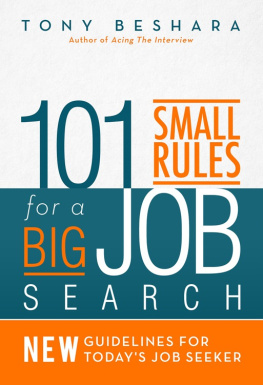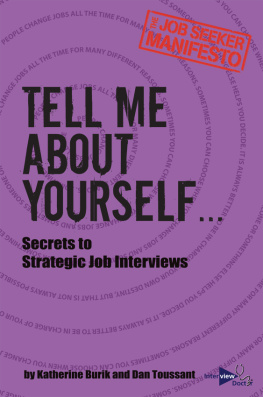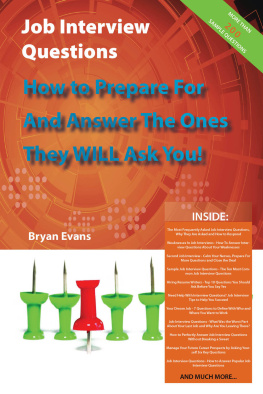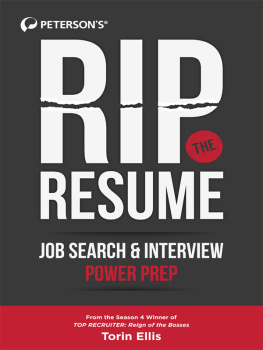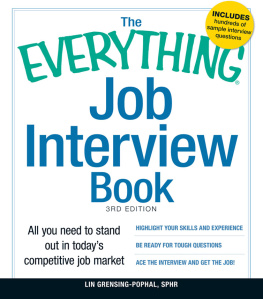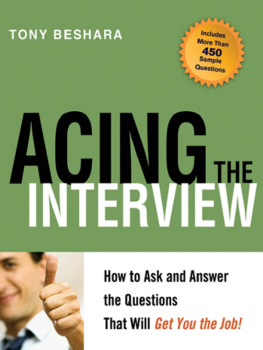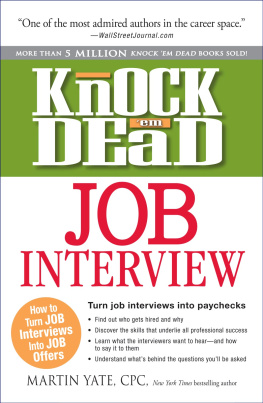A SAVIO REPUBLIC BOOK
An Imprint of Post Hill Press
ISBN: 978-1-68261-368-9
ISBN (eBook): 978-1-68261-369-6
101 Small Rules for a Big Job Search:
New Guidelines for Todays Job Seeker
2017 by Anthony Beshara
All Rights Reserved
Cover Design by Quincy Avilio
No part of this book may be reproduced, stored in a retrieval system, or transmitted by any means without the written permission of the author and publisher.

Published in the United States of America
PART FIVE
RULES FOR GETTING A JOB OFFER
Opportunities dont often come along. So, when they do, you have to grab them.
Audrey Hepburn
85. G ETTING AN OFF ER YOU DONT WANT TO TAKE.
If you get an offer that you just dont think you are going to take, it may not hurt to hear the offer out in total. There is a chance that you may have misunderstood many things regarding the job, title, money, or benefits. Again, you have nothing to consider until you have an offer.
If you are certain that you are not going to accept the job, it is best to tell the prospective employer within a reasonably short period of time. Also, I recommend calling the hiring authority to tell the person how much you appreciate the offer, but at this time you are not in a position to accept it.
Always try to leave the door open. If you turn down an opportunity, do it with grace and style. Whatever you do, do not burn bridges by being aloof, condescending, or egotistical. Be very graceful and recognize that you may need an offer from this organization somewhere down the line. I cannot tell you the number of times that I have tried to present a qualified candidate to a good opportunity with a firm that in the past tried to pursue the candidate and he or she had been so rude in dealing with the company that its staff wouldnt consider giving the candidate the time of day. People dont forget when other people are rude to them or treat them in a condescending manner.
If you really want to keep the door open for the future, try this: After you turn down the offer, send the hiring authority a nice note thanking the person for his or her time and effort along with a $10 gift certificate to Starbucks or someplace like it, or maybe a book on the hobby you have in common, like golf or cookingany small gift that the person will remember you by. This gesture alleviates the irritation that the hiring authority might have over you not taking the job, keeps the door open for future opportunities, and, above all, reinforces the personal relationship that you might have established with the hiring authority.
86. GETTING AN OFFER YOU MIGHT TAKE.
Begin by knowing everything there is to know about the opportunity. Get the offer and evaluate it. If you are fortunate enough to be able to compare one offer with another, do it quickly. Another bit of advice is to never compare an offer in hand with one that you might get in the near future. A bird in the hand is always more valuable than one in the bush.
Now, if you have a job offer in hand, it is advisable to call any other organizations that you might be considering and tell them you have an offer, and you would like to hear from them by a certain time. You need to put a time limit on this. You dont have much choice, but you might ask the company that has actually given you an offer if you could have a day or so to think about it. However, most organizations wont go beyond a day or so in granting you that time. This is due to fear of losing other candidates who might be viable if you turn the offer down.
By the way, if you are going to discuss other offers with the hiring authority, in order to negotiate and compare, do it only with offers you actually have. And dont hesitate to tell the hiring authority who those offers are with. Most hiring authorities dont believe you when you talk about the proverbial other opportunities. They consider it to be a bluff.
Some candidates, over the years, have tried to ask the hiring authority for as much as two weeks to make a decision. This screams, Im trying to get another offerwont know about it for a week or two. If I dont get it, I might take your job. No smart hiring authority will grant this. I advise my clients to give a candidate one or two days to decide. Even if you are granted more than a day or two, the hiring authority is going to start thinking, This person is playing this offer against another one. I may lose the next best candidate. I cant afford that. Then he or she will turn around and hire the next best candidate, without your knowledge. Decide, but do it quickly.
87. GETTING AN OFFER YOU WANT.
This is really easy to do. Once you get the offer, tell the hiring authority that you would like to come in and personally discuss the offer face-to-face. The only word of caution I might give you in this situation is to not shut down the interviewing process with any other organization until you are sure of the offer and have it in hand. Even then, I would be sure to try to keep my options open just in case things fall through.
I dont want to jinx anything, but I have experienced numerous instances of candidates being told that they were going to get an offer and then the job never actually materialized. So, when an organization tells you that it would like to make an offer, set a face-to-face meeting to go over the details of the offer and negotiate, if you are going to, but dont tell any other organization that you are in the process or that you are going to accept an offer with someone else.
88. NEGOTIATE WITH A PURPOSE.
In general, your ability to negotiate an offer depends on the economy and your individual situation. You can get a good sense of the latitude and leverage that you might have in the offering stage by simply paying attention to what you are hearing during the interviewing process. For example, if there are few people in your profession and they are always in high demand, the numbers of opportunities that you are going to have available to you, and your ability to leverage offers, is greater. If, on the other hand, the market is glutted with candidates, your choices and leverage are not very great.
I would never recommend negotiating an offer over the telephone or through email. The only exception to this might be when distance is an issue. Now, the final offer can be discussed and confirmed over the telephone or by email, but if there is going to be any kind of negotiation over specific aspects of the offer, those are always best done face-to-face.
Negotiating an offer, and how it is extended, is done in many different ways by many different organizations, so I cant cover them all here. Some companies send offer letters through their corporate office, sometimes from far away. If any negotiation is to be done, it needs to be done before the offer is put into writing. Some companies provide an offer letter, and, once that offer letter is in the candidates hands, the candidate negotiates with the hiring authority. To avoid problems, the candidateonce it is understood that he or she is going to get an offershould ask the hiring authority how the company would like to proceed with negotiations.
Some companies will make it very clear that there is no negotiation at all in the offer that they will make. Some companies accept the idea that everything is negotiable. Since there is no way of knowing where a company falls between these two poles, you should simply ask for a face-to-face meeting to discuss the offer before it is formally given.
Once you ask for the face-to-face meeting, you should write down every issue that might be covered in the offer discussion. By the way, I do not recommend negotiating an offer with anyone other than the hiring authority. If the HR department insists on making the offer, you have to insist that you need to have a conversation with the hiring authority before you entertain a formal offer. It would be a bad sign if a hiring authority will not discuss a job offer with you before a formal offer is made. In other words, you want to negotiate with the person who has the greatest pain.
Next page
